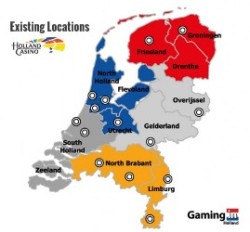Netherlands on Track to Regulate iGaming in 2017

The Netherlands has long been a progressive nation with laws that allow for a large amount of personal freedom. That’s why it’s a bit surprising that the country hasn’t moved to regulate and legalize iGaming for foreign operators yet. Those days have finally come to an end, though, as the Netherlands is in the process of implementing the details of the Dutch Remote Gaming Bill, which will legalize iGaming and regulate it under the Dutch Gaming Authority. The process has been underway for some time, and Dutch legislators believe that everything will be in place for remote gaming to officially launch sometime in 2017.
What Will Be Allowed Under the Bill
Some of the provisions of the Remote Gaming Bill include:
– The Issuing of Licenses. Under the Remote Gaming Bill, operators will be able to apply for business to consumer (B2B) licenses to launch iGaming sites and accept players from the Netherlands. Licenses will remain valid for 5 years, at which time, licensees in good standing with the Dutch Gaming Authority will have the opportunity to renew their licensure.
The Dutch Gaming Authority has already met with some prospective licensees. In a recent interview, Marja Speak of the Gaming Authority stated that overall, 335 prospective operators have expressed interest in licensing. The parties range from already established operators who have sites in other parts of Europe to small businesses that hold slot machine licenses in the Netherlands. Speak stated that the Gaming Authority does not anticipate all 335 prospective operators to apply for a license. In fact, she said that the authority believes only a very limited number of companies will actually follow through and begin the licensing process.
– The Regulation of Many Types of Online Gaming. The Remote Gaming Bill will give the Dutch access to many types of games. The law legalizes and regulates online poker, casino games and exchange and sports betting.
– A High Tax Rate in Place. Licensed operators will be expected to pay 20 percent of gross gaming revenue as a tax to the Netherlands. The tax rate is steep, but based on the numbers provided by Speak, the high rate of taxation isn’t enough to completely rule out the possibility of applying for a license for more than 300 companies.
– An Emphasis on Local Operators. The Remote Gaming Bill allows prospective operators from both inside and outside the Netherlands to apply for licensing; however, the goal of the legislation is to stimulate the Dutch economy by placing a priority on local operators. The bill sets a goal for 80 percent of Dutch gaming demand to be met by operators that are locally based. It’s unclear yet whether or not that goal will be feasible.
– Bad Actors Will Not Be Granted Licenses. Currently, a number of companies are illegally providing online gaming services to the Dutch. The Remote Gaming Bill has stipulations that prevent these companies from receiving a license to operate.
Privatization of Holland Casino
In other Dutch related gambling news, the government is now looking to sell off the state-owned Holland Casino chain, and last month sent a bill containing the proposal to Parliament. In 2015, the land-based casino group had an EBITDA of 105 millions euros, and turned over a net operating profit of more than 67 million euros, making it a particularly attractive proposition for potential investors.
According to financial studies, sale of the casino group has the potential to be bring in around 1 billion euros for the government, although other analysts suggests the actual figure is likely to be significantly less. One salient reason is because Holland Casino does not currently pay corporate tax being a state-owned company, but following privatization it will have to pay the same standard 25% rate as other similar companies.
When drawn on the question of the company’s potential value, Holland Casino’s CEO Erwin van Lambaart said:
“We cannot say yet. To our shareholder [Dutch State], the financial benefits are not the only thing that matters. It is also about continuing the policy of prevention [addiction, fraud, crime]. Also, every buyer will have its own strategic considerations with regard to how much they are willing to pay.”
The Dutch State will have to wait and see how much Holland Casino’s final sales price will be, however, as a deal is not expected to be concluded until sometime in late 2017.









